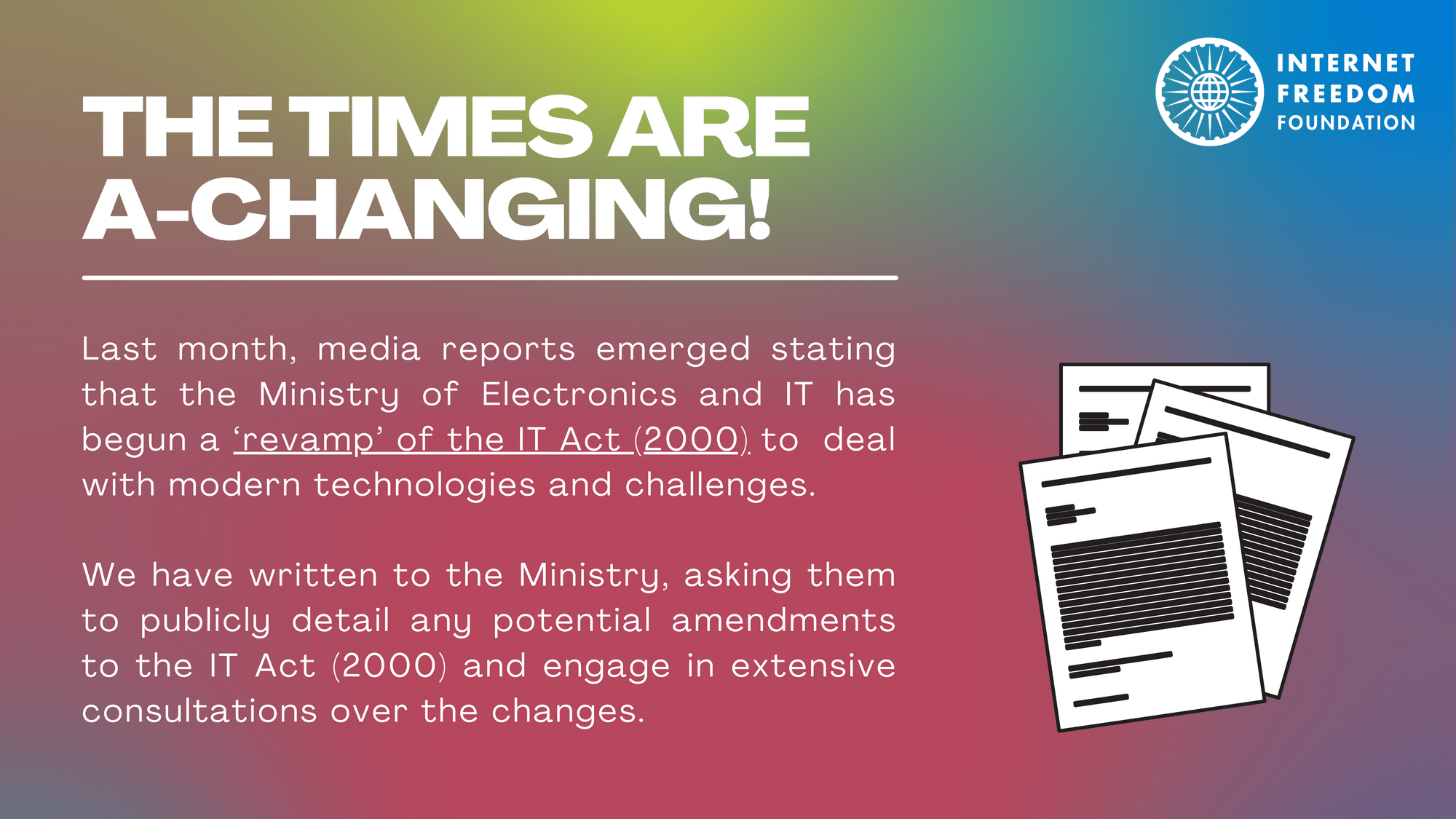
Tl;dr
Given recent media reports and parliamentary responses, we wrote to the Ministry of Electronics and Information Technology asking them to publicly detail any potential amendments to the Information Technology Act, 2000 and engage in extensive consultations over the changes.
Potential changes incoming
Last month, multiple media reports (see here and here) emerged stating that the Ministry of Electronics and Information Technology had begun a ‘revamp’ of the Information Technology Act, 2000. These reports stated that discussions over updating the Act to better deal with modern technologies and challenges. These changes would also involve harmonising the Act with the provisions of the Personal Data Protection Bill, 2019.
On February 3rd, 2021, an answer to a Lok Sabha question stated that “MeitY has initiated work on amendment to the Information Technology Act, 2000 which, inter alia, includes strengthening the provisions for intermediaries for making them more responsive and accountable to Indian users.” Furthermore, an RTI request we had filed received an answer on February 4th, 2021 that revealed that the Ministry had begun to interact with stakeholder ministries over potential amendments to the Act.
Need for change
In the two decades since the Information Technology Act, 2000 was originally enacted, significant technological, policy, and legal developments have taken place that subsequent amendments have not been able to completely account for. The ubiquity of smartphones and internet technology in modern life calls for a new paradigm of regulation on diverse subjects such as Artificial Intelligence and Machine Learning technologies, electronic financial services, and online gambling.
Another key development is the emergence of progressive data protection paradigms. In its judgement in Shreya Singhal v. Union of India, the Supreme Court struck down section 66A as unconstitutional and draconian, stating that the provision was vaguely drafted and significantly violated the right to free speech guaranteed under articles 19, and 21 of the Indian Constitution. However, this progressive judgement has been hampered by the continued use of the provision (or similar provisions) in the indian legal system, as acknowledged by the Supreme Court itself. Our Zombie Tracker tool has provided a detailed a list of these 'legal zombies', with 1,988 cases having been registered under section 66A as of today. Thus, there is a need to provide safeguards against such phenomenon.
Additionally, in light of the Supreme Court’s judgement in Justice K. S. Puttaswamy (Retd.) and Anr. vs Union Of India And Ors, provisions of the Act that relate to privacy, such as section 69, to accommodate the proportionality standards laid down in the aforementioned judgement. For example, the recent debacle over the account blockages on Twitter have attracted signficiant public furore over section 69A, which has attracted criticisms not only with respect to proportionality but also with regards to operational transparency. Provisions that relate to data protection, such as sections 43A and 67C, may also need to be brought in line with modern data protection practices and the Personal Data Protection Bill, 2019.
Recommendations
Given the attendant concerns that arise from the above, we requested the Ministry to publish a full consultation timeline over any potential amendments in line with several health precedents for public consultations set in the past. Presently, no such timeline exists, while the Standing Committee on Information Technology also does not seem to be considering this issue (it does not seem to be in the list of subjects or in the list of sittings - see here). Furthermore, we ask that extensive dialogues be conducted with academics, civil society, digital rights experts and organisations, and technologists, as such groups would provide a unique citizen-centred perspective that would complement the more business or administration friendly inputs of other stakeholders.
Important Documents
- IFF's letter to MEITY Regarding potential changes to the Information Technology Act, 2000 (link)
- The Information Technology Act, 2000 (link)
- Lok Sabha Unstarred Question No. 235 ("Privacy Policy of Whatsapp") answered on 03.02.2021 (link)
- RTI Request DITEC/R/E/21/00054 filed with the Department of Eelctronics and Information Technology (link)
